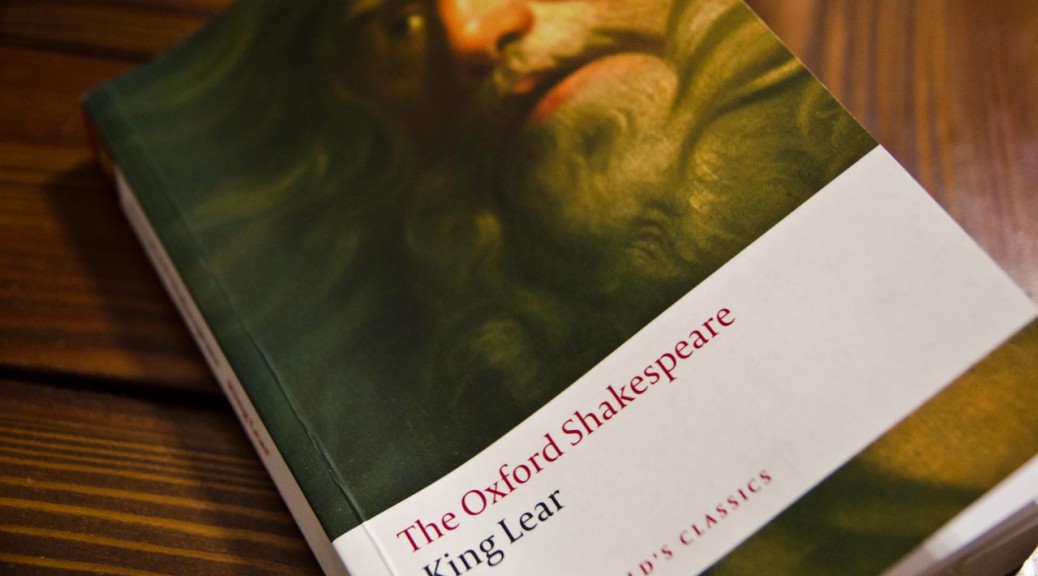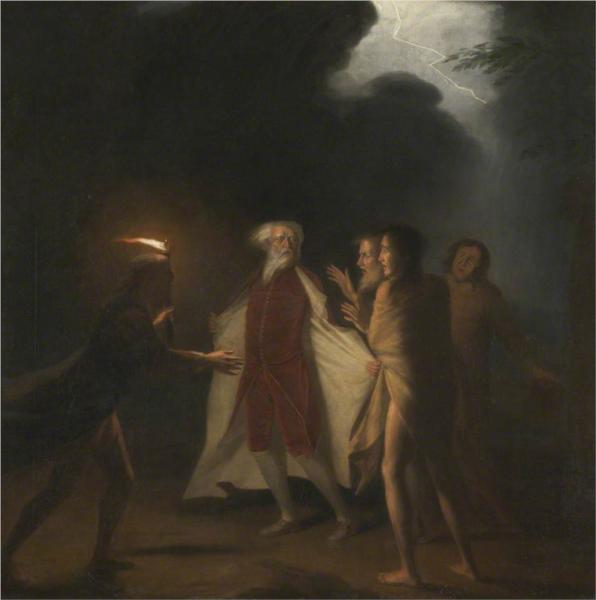Shakespeare, William, and Stanley Wells. The History of King Lear. Oxford: Oxford UP, 2008. Print.
To read:
Prometheus Vinctus by Aeschylus

Dirck van Baburen – Prometheus Being Chained by Vulcan. circa 1594/1595–1624). Via Wikimedia.
Introduction by Stanley Wells
“The folio is, after all, a derivative, adapted, and edited text.” p. 8
“Muir, however, notes eclipses of both sun and moon in 1601 ‘that would still be remembered by the audience’, and there was a partial eclipse of the moon in May 1603.” p. 12
“Titus Andronicus he had already portrayed an elderly tyrant who goes mad” p. 14
To Read:
The Theme of the Three Caskets by Sigmund Freud
“proposes that the opening scene is based on an ancient myth of a man’s having to choose among three women, the third one represents death. footnote p. 16
Historia regum Britanniae
“written by the learned and imaginative monk Geoffrey of Monmouth” p. 17

Illumination of a 15th century manuscript of Historia Regum Britanniae showing king of the Britons Vortigern and Ambros watching the fight between two dragons. Via Wikimedia.
“Gonorilla to the Duke of Cornwall, Regan to the Duke of Albania, or Albany, the northern part of Britain. Later Aganipus, King of the Franks, married the dowerless Cordeilla for love.” p. 17

Cordelia. 1888. William Frederick Yeames (1835–1918). Via Wikimedia.

Edwin Austin Abbey (1852–1911) King Lear, Cordelia’s Farewell. Metropolitan Museum of Art – New York, NY . Via Wikimedia.
“Aganippus raised an army to restore him to his kingdom; they succeeded, and three years later Lear died. (By this time he must have been very old indeed.) Cordeilla, widowed, buried her father at Leicester. Some years later her nephews rebelled against her, captured her, and put her in prison, where she committed suicide.” p. 17
to read:
Arcadia by Sir Philip Sidney
“In reading it, Shakespeare must have been struck by the relation between the Lear story and the episodes in Arcadia telling of a Paphlagonian king deposed and blinded by a wicked, illegitimate son but cherished by the natural son whom, under the influence of the bastard, he has cast off with orders-not obeyed-that he be killed.” p. 26
“Shakespeare is indebted to Arcadia for plot motifs and atmospheric effects rather than for language.” p. 26
“The Bible exerted a strong influence, even though Shakespeare has been at pains to locate his action in a non-Christian, pagan society; indeed, both the Book of Job and the parable of the Prodigal Son have been regarded as deep sources of the play.” p. 29
George Orwell essay: Lear, Tolstoy and the Fool.” p. 32
Tolstoy on Shakespeare wikipedia article
Tolstoy on Shakespeare; a critical essay on Shakespeare
“It might on the contrary be argued that Shakespeare’s opening scene is a masterpiece of dramatic exposition-almost a little play in its own right-and that its reduction and simplification of motive is one of the ways in which it establishes a mode in which symbol and emblem will have as important a part to play as psychological verisimilitude.” p. 33
Michael Gambon playing the Fool “That weekend I hurried to London Zoo to watch the chimps and became even more convinced that they had all the requisite qualities for the Fool-manic comic energy when in action, a disturbing sadness when in repose.” p. 42
“But the suffering diminishes when madness comes upon him. As Gloucester is to realize later in the play, madness can bring relief from suffering.” p. 45
footnote Howard Felperin “takes a contrary view: Gloucester ‘naïvely wishes he could go made like Lear, mistaking madness for a protection against pain when it is in fact an exposure to it.” p. 45
“Suffering teaches both men how they have misvalued their offspring, and leads them to acknowledge their own faults and to express humility.” p. 46

José Ribera, Ixion (1632). Oil on canvas, 220 x 301 cm. Museo del Prado, Madrid. Via Wikimedia.
See Ixion
literary context of ‘bound upon a wheel of fire‘ p.47
“The Wheel of Fire is part of the Aristotelian reading of a tragedy (e.g. plays), which includes the central flaw within a character.” wikipedia
“To its early audiences, the language of King Lear must have seemed very strange, as original in its day as that of James Joyce or Dylan Thomas in theirs.” p. 53
To read:
Dylan Thomas
poems: Do not go gentle into that good night, and And death shall have no dominion.
Margreta de Grazia “the play itself goes to extremes, pushing beyond the bounds of tragedy, particularly in its superfluous addition of Cordelia’s death.” p. 53
“What Tate did to Shakespeare was not essentially different from what Shakespeare had done to King Leir: Shakespeare had turned an old tragicomedy into a tragedy, Tate reversed the process. In doing do created a new, different play which, critics have increasingly argued, has its own artistic validity.” p. 62
King Leir play
Nahum Tate‘s King Lear adaptation
“But at the time Tate wrote, Shakespeare was not thought of as an immortal classic, but as a dramatist whose works, however admirable, required adaptation to fit them for the new theatrical and social circumstances of the time, as well as to changes in taste.” p. 62
Tate’s play “supplanted Shakespeare’s play in every performance given from 1681 to 1838.” p. 63
See John Runciman (1744-68), King Lear in the Storm (1767)
See Alexander Runciman (1736-85) King Lear on the Heath (1767)
“Barker insists that the storm is not in itself ‘dramatically important, only in its effect upon Lear’, and that the actor should ‘impersonate both Lear and-reflected in Lear-the storm’.” p. 72
King Lear (1970) Grigori Kozintsev
The Tale of Lear (1984) Tadashi Suzuki
King Lear (1987) Jean-Luc Godard
King Lear (1971) Peter Brook
King Lear (1983) Michael Elliott
A king Lear of the Steppes (1870) Turgenev
King Lear’s Wife (1915/1920) Gordon Bottomley
Lear (1971) Edward Bond
Book: A Thousand Acres (1991) Jane Smiley
“The language of Shakespeare’s time was permeated by the Bible.” p. 87

